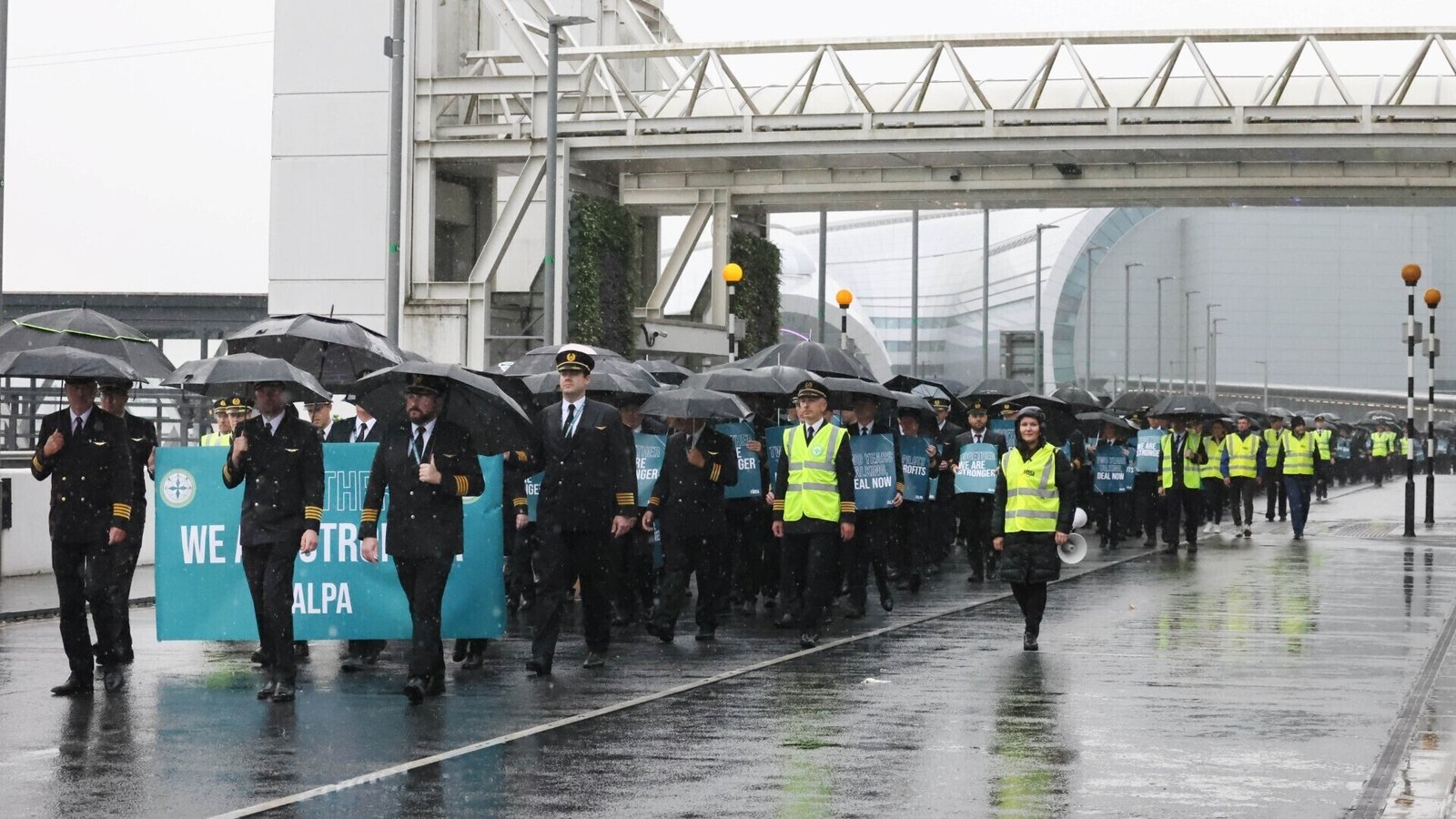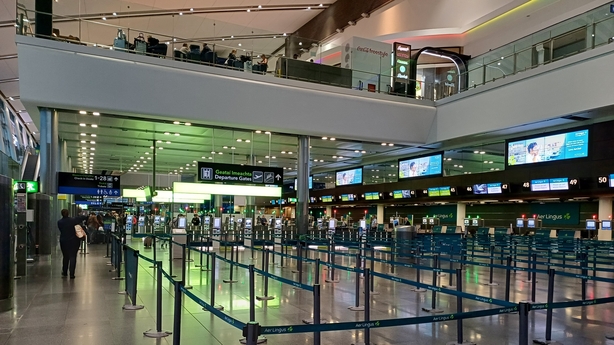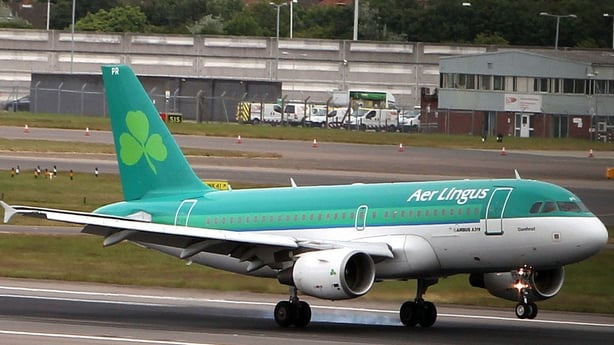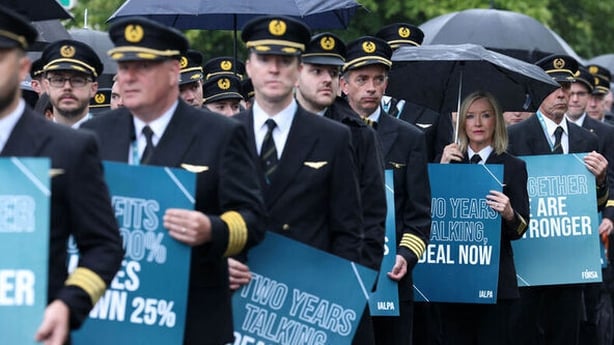Bussiness
Key moment in Aer Lingus dispute as patience wears thin

Visitors to Dublin Airport early yesterday morning could have been forgiven for thinking there was a funeral in process there.
As another dawn broke over the airfield and the rain teemed down, hundreds of men and women dressed in black and carrying dark umbrellas, marched stoney faced and in relative silence through the complex.
The scene was reminiscent of a cortege; yet thankfully nobody had died.
Instead, this was the sombre sight of Aer Lingus pilots, dressed smartly in their full dark coloured uniforms complete with hats, exercising their right to strike in protest at their employer’s refusal to meet their demand for a 24% pay increase.
But the funeral imagery captured the mood of the situation well.
After two years of talking to each other about that pay rise, the parties have run out of road.
Face-to-face talks, an internal pay tribunal, sessions in the Workplace Relations Commission and in the Labour Court have failed to break the deadlock.
And so the pilots, led by their union the Irish Airline Pilots Association (IALPA), have ratcheted the conflict up a notch, or two.
Last Wednesday, they began indefinite industrial action, which includes a strict work to rule, not working overtime or any other out of hours duties requested by management, only working published rosters and not logging into work systems or taking calls out of.
Just to flex their muscles a little further, they also held an eight-hour work stoppage yesterday, to remind management of the airline how much power they wield.
The result has been devastating for passengers, coming as it has just as schools finish and families head off on summer holidays they have been saving for and looking forward to all year.
Already 390 flights have been officially cancelled in advance up to this day next week, including 120 yesterday during the work stoppage.
Those cancellations were designed to give Aer Lingus the capacity to safeguard other services which will operate as planned.
But the work to rule is also biting for some of those flights that are due to proceed.

For example, one evening late last week a technical issue delayed an Aer Lingus flight returning to Ireland from taking off.
That delay put its pilots over their rostered working hours and so when the issue was sorted out they said they would not work the required overtime and the flight was cancelled.
Those types of incidents could well become more common as the industrial action continues, unless some sort of resolution can quickly be found.
Right now though, that does not seem likely at all.
After finding no grounds upon which to hold further talks last Tuesday, the Labour Court sent both sides away to consider their positions, with a request (or warning depending on how you look at it) to them not to do anything to escalate the situation.
On Wednesday the work to rule began, but Aer Lingus still invited IALPA to face to face talks on Thursday to see if progress could be made.
They lasted all of five hours before they collapsed and both sides emerged, blaming each other for the failure.

IALPA was annoyed the gesture it made going into the meeting of reducing its 24% pay claim (by what Aer Lingus subsequently claimed was a minimal amount) was not reciprocated by the airline.
The pilots also accused Aer Lingus management of escalating the dispute by denying a captain access to an executive lounge he would normally have been allowed use, stripping pilots of their travel privileges and by telling pilots that they intended to renegotiate all previous collective agreements.
Aer Lingus was equally indignant at what it saw as the pilots’ complete refusal to consider talking about productivity and flexibility changes in return for the pay increase.
The company is insisting this has to be part of any deal, because other non-pilot groups of employees in Aer Lingus have received a 12.25% pay increase and giving the pilots any more than that without work practice changes in return would open the flood gates to further pay claims.
The carrier called for the pilots’ union to seek a revised mandate to allow discussions around the issues of productivity and flexibility to take place.
It also appealed to it to back a joint referral of the dispute back to the Labour Court – a reflection perhaps of the low point that had been reached in relations.

But rather than go that route, IALPA’s executive instead decided to pursue plans for an escalation in its industrial action, in response to what it claimed was Aer Lingus’ escalation, by asking the disputes committee of parent Forsa to sanction a further work stoppage.
So by Thursday evening, the situation looked more intractable than ever, despite growing vociferous calls from increasingly frustrated members of the Government for the two sides to talk.
Friday morning came and went without much movement.
But in the early afternoon, Aer Lingus announced 122 further flight cancellations for Wednesday to Sunday this week on foot of the ongoing work to rule, plunging the travel plans of tens of thousands more passengers into chaos.
A ray of hope followed though in the form of a fresh invitation from the Labour Court to both sides to return to talks on Monday.
Aer Lingus immediately jumped at the idea and accepted the invitation.
So too did IALPA’s parent Forsa.
In an unusually blunt assessment that says much about where the dispute is at, it said its view is that it is at a critical point, and the outcome of any Labour Court process will be crucial.
“Should it fail, we are looking at a situation much worse than it is at present and a greater likelihood of escalating industrial action,” it warned.
So the question facing Aer Lingus and its pilots now is what are they willing to risk and how much collateral damage are they willing to inflict on each other and the public before they get there?
It took IALPA itself a little longer to accept the invitation, but by Friday night it had also done so.
It also paused its plans to escalate its industrial action as that would likely have been frowned upon by the court had it not.
So the stage is now set for further crunch talks tomorrow.
Where a path to a resolution might come from is far from clear though.
Pilots insist they will not negotiate about work practice changes in return for a pay increase, because they are due cumulative cost of living increases since 2019, the last time they had a pay rise.
On the other side, the airline is digging in on its demand for work practice changes for any pay hike above 12%.
But while it is very unclear as to how the Labour Court might bridge the gap between the sides, what is very clear is that any tolerance and understanding shown by the public, businesses and politicians for both parties positions is running out fast.
Read more:
Aer Lingus pilots return to work following eight-hour strike
Labour Court invites Aer Lingus, IALPA to attend meeting
Aer Lingus flight disruption ‘a disaster’, say passengers
Few things vex people more than having their holiday plans thrown into doubt and while many people respect workers rights to strike, for most there is a limit to that understanding, which the pilots may well be rapidly approaching.
Businesses are becoming very concerned at the impact the pilot’s action is having on tourism, connectivity and Ireland’s reputation overseas and the Government is also growing increasingly frustrated with the impasse.
While for Aer Lingus, which last year made a profit of €225m, holding out in its entrenched position much longer could prove massively damaging to the long-term value of its brand and the customer loyalty associated with it.
How long its parent IAG will continue to back Aer Lingus management’s hardline stance, or indeed whether it is insisting on that stance perhaps, is also an unknown.
It was noteworthy though that on Thursday, IALPA representatives made a point of taking time out from talks to brief airline investors on the background to the dispute.
The Labour Court will have its work cut out for it if it is to bring the two sides together.
All disputes do eventually come to an end though.
So the question facing Aer Lingus and its pilots now is what are they willing to risk and how much collateral damage are they willing to inflict on each other and the public before they get there?










